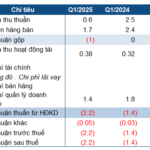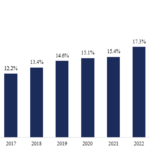From “Investor” to Gambling Disorder
Recently, Dr. Le Thi Thu Ha, Head of Room M7, Institute of Mental Health, Bach Mai Hospital, received a 36-year-old female patient from Hanoi who was admitted with a mental disorder due to stock investment losses.
The patient is a homemaker who takes care of four children while her husband is the main breadwinner. With a desire to contribute financially, she started investing in stocks. Initially profitable, she gradually got sucked into the investment vortex and couldn’t stop even when she started losing money and accumulating debt. When her family discovered what was happening, they confiscated her phone, but she still found ways to continue investing, even resorting to high-interest loans and pawning valuables.
The huge debt forced her husband to sell their house, and the family had to move back to their hometown. The patient’s parents also had to sell their land to help repay her debts. The patient once ran away from home and contemplated suicide but stopped short, thinking of her children.
At the hospital, she was diagnosed with gambling disorder related to stock trading, accompanied by anxiety and depression. However, she denied having any illness and believed her husband had fabricated the story to have her institutionalized.
After receiving psychological therapy and medication, her condition improved significantly, and she no longer felt the urge to invest. She now works with her husband to repay their debts.
Dr. Ha noted that this is a typical case of modern gambling disorder, which not only includes card games and betting but also encompasses stock trading when it becomes uncontrollable, leading to severe mental health issues.

An example of someone addicted to stock trading (Photo: N.M)
Another case involved a 34-year-old patient, T.N.H., who was admitted to the hospital by his family due to depression, insomnia, and a history of leaving home to gamble for several months.
According to BSCKII. Cao Thi Anh Tuyet from Room M7, Institute of Mental Health, the patient started betting on football matches during his student days, gradually increasing the frequency and stakes. After losing his job and the opportunity to work abroad, coupled with marital problems, he sank deeper into gambling.
H. became reclusive, spending 60-80 million VND per month on gambling and living expenses. In the last six months, he exhibited symptoms of depression, anxiety, weight loss of 10 kg, tremors, and insomnia. He was diagnosed with anxiety disorder, depression, and pathological gambling disorder, along with Basedow’s disease. After a week of treatment, his condition improved.
Gambling Disorder: A Quiet Life Destroyer

BSCKII. Bui Nguyen Hong Bao Ngoc discussing gambling disorders (Photo: NM)
Experts estimate that the prevalence of gambling disorder could be as high as 1% of the population, exceeding the rate of schizophrenia (0.3-0.5%).
According to BSCKII. Bui Nguyen Hong Bao Ngoc, Deputy Head of Room M7, Institute of Mental Health, gambling disorder is characterized by a loss of control over gambling behavior, despite awareness of its negative consequences. The temporary relief felt after each gambling session is often followed by regret and self-blame, yet the person is unable to stop, leading to a dangerous cycle.
This condition inflicts severe damage on one’s finances, relationships, and mental health, similar to alcohol or drug addiction. As many people hide their gambling behavior, they often seek help only when the disorder has progressed significantly.
Gambling disorder typically follows two patterns: episodic (characterized by periods of relapse and stability) or persistent (lasting continuously for many years, with individuals describing a strong urge and preoccupation with gambling). Diagnosis is based not only on gambling frequency but also on the consequences it brings about. Those who engage in lottery or online card games for entertainment without exhibiting mental health symptoms are not considered pathological gamblers. However, if gambling involves significant amounts of money and valuables—such as stock trading, betting, or lending—and the individual is unable to stop, it is classified as “dangerous gambling”.
According to Dr. Bao Ngoc, up to 96% of people with gambling disorder simultaneously suffer from one or more other mental health disorders, with personality disorders accounting for 60%, mood disorders 50%, and anxiety disorders 40%.
Treating gambling disorder involves more than just stopping the behavior; it requires a combination of psychological therapy, medication, and, in severe cases, brain stimulation techniques. Early detection and timely treatment are crucial for individuals to overcome this disorder.
The Young Man’s Debt: A Tale of a 3.7 Billion Dong Debt and a Missing Debtor
Introducing the master of deception, Dat, who weaves lies to secure loans, leaving a trail of broken promises and unpaid debts in his wake. With his silver tongue, he spins tales of financial need, ensnaring unsuspecting lenders in his web of deceit. This crafty individual manipulates the system, using loans to settle scores with banks, only to default on his obligations.
“PVH’s Accumulated Losses: Navigating Through the Audit Opinions and their Impact on Trading”
Thanh Hóa Petroleum Installation Joint Stock Company (UPCoM: PVH) has been placed under trading restrictions since October 4, 2024, with HNX upholding this decision on April 10, 2025. Meanwhile, the company’s first-quarter financial statements for 2025 continue to show losses.
The Debt Burden’s Drag on Economic Growth
Debt is a pivotal tool in the modern financial system, stimulating consumption and investment while contributing to economic growth. When managed prudently, credit enables businesses to expand their production, enhance operational efficiency, and improve labor income, thereby creating a positive ripple effect on the economy. However, debt growth is not a panacea for perpetual expansion, as the burden of interest payments can become onerous.
The Ultimate Guide to Saigontel’s Ambitous Endeavor: Unlocking the $1.6 Billion Loan for Vietnam’s Industrial Revolution
On December 12th, the Board of Directors of Saigon Telecommunication Technology Corporation (Saigontel, HOSE: SGT) approved a resolution to accept a credit facility of up to VND 1,635 billion from VPBank. This financing will be utilized to invest in the second phase of the Dai Dong – Hoan Son Industrial Park project.





















